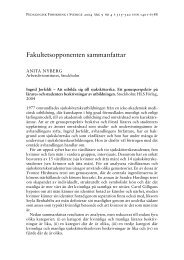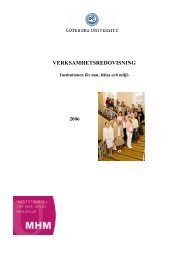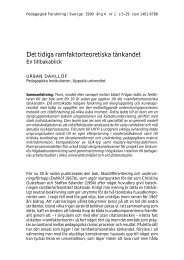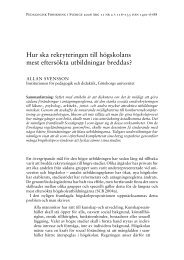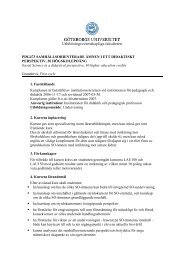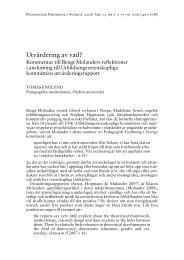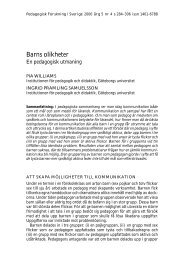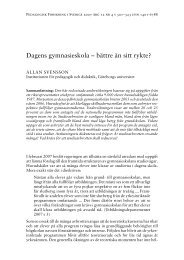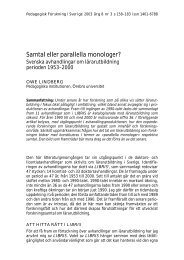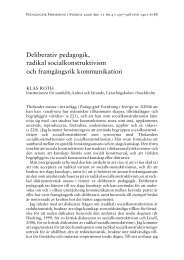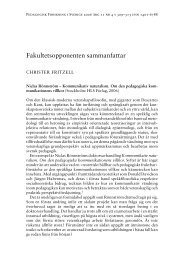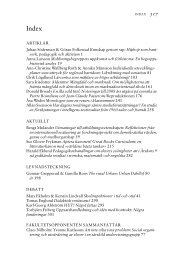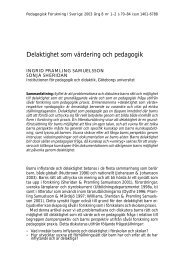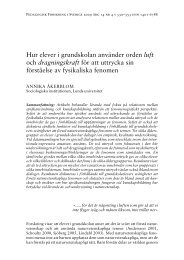University of Oslo Workshops June 29-30 Conference July 1-3 ...
University of Oslo Workshops June 29-30 Conference July 1-3 ...
University of Oslo Workshops June 29-30 Conference July 1-3 ...
Create successful ePaper yourself
Turn your PDF publications into a flip-book with our unique Google optimized e-Paper software.
1 <strong>July</strong><br />
10:<strong>30</strong>-12:<strong>30</strong><br />
Room: AK 2137<br />
Chair: Caroline Liberg<br />
Discussant: Laurence Ogle<br />
Track B PIRLS - Session 1<br />
International comparisons <strong>of</strong> reading literacy<br />
The Relative Risk-Percentage Equity Index: Measuring Equity in Reading<br />
Achievement Across PIRLS 2006 Countries<br />
Kathleen Trong, TIMSS & PIRLS International Study Center, Boston College, USA<br />
This research used data from PIRLS 2006 to explore an approach to measuring equity in<br />
reading achievement internationally at the fourth grade. Relative risk ratios were selected<br />
as a measurement approach and were used to create a composite measure, the Relative<br />
Risk-Percentage (RRP) Equity Index, to compare equity in reading achievement across<br />
countries. This index was used to present the likelihood <strong>of</strong> scoring below the PIRLS 2006<br />
Low International Benchmark for student groups that were traditionally at risk for low<br />
reading achievement compared to other students. The ‘at risk’ student groups that were the<br />
focus <strong>of</strong> this study included those with low parental education, who spoke a language other<br />
than the language <strong>of</strong> instruction, who attended urban or rural schools, and who were boys.<br />
To complement the RRP Equity Index results, the relative likelihood <strong>of</strong> students scoring<br />
within the lower 20 percent <strong>of</strong> their country’s reading achievement distribution was also<br />
presented. Overall, having parents with less than secondary education and not speaking the<br />
language <strong>of</strong> the test before starting school were associated with inequity in reading<br />
achievement in the largest number <strong>of</strong> PIRLS 2006 countries.<br />
Keywords: equity; relative risk; literacy; PIRLS; reading achievement<br />
<br />
National Contexts Influencing Principals’ Interaction with Students: Macro<br />
Geographical Region, Societal Culture and Educational System<br />
Moosung Lee, The Joseph Lau Luen Hung Charitable Trust Asia Pacific Centre for Leadership and<br />
Change, Hong Kong Institute <strong>of</strong> Education, Hong Kong<br />
Philip Hallinger, The Joseph Lau Luen Hung Charitable Trust Asia Pacific Centre for Leadership and<br />
Change, Hong Kong Institute <strong>of</strong> Education, Hong Kong<br />
This paper examines principals’ time use for interaction with individual students.<br />
Specifically, this paper attempts to illuminate how three national-level contexts (i.e. macro<br />
geographical region, societal culture, and educational system) influence principals’ time<br />
allocation for interaction with students when key organizational-level contexts are<br />
controlled for. For the current research, the Progress in International Reading Literacy<br />
Study (PIRLS) 2006 was used. The current research includes 5,<strong>29</strong>7 principals from 34<br />
societies. A two-level hierarchical linear model (HLM) was utilized (Raudenbush & Bryk,<br />
42



